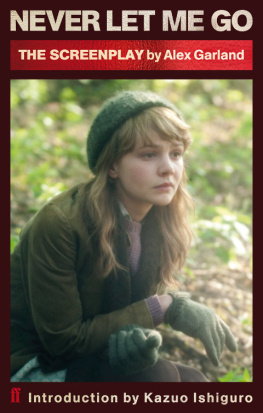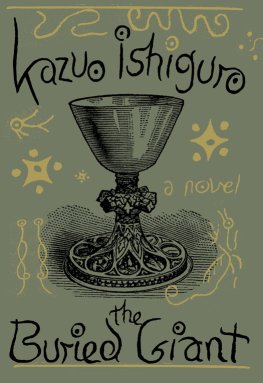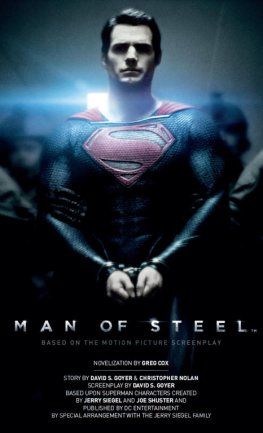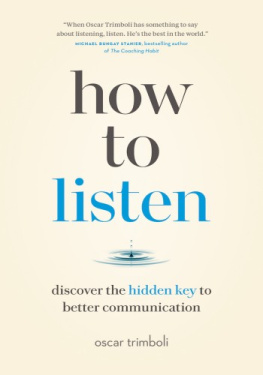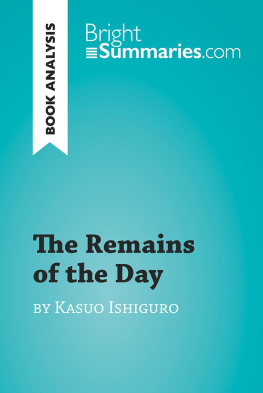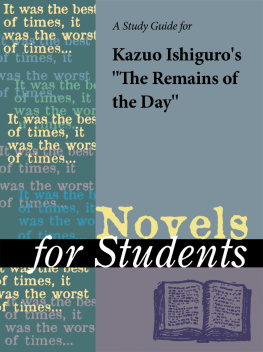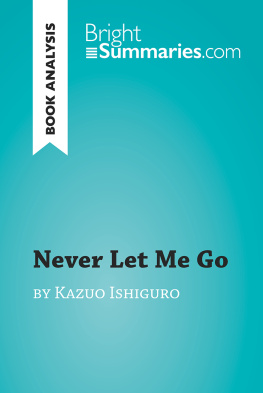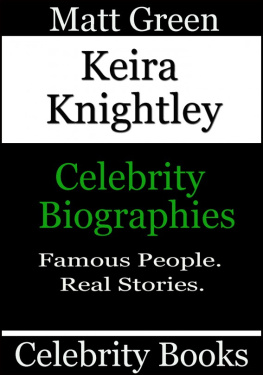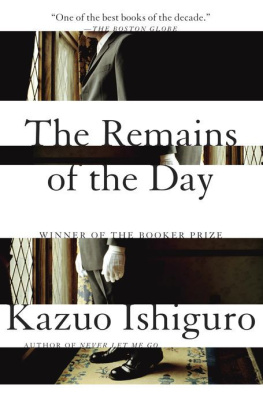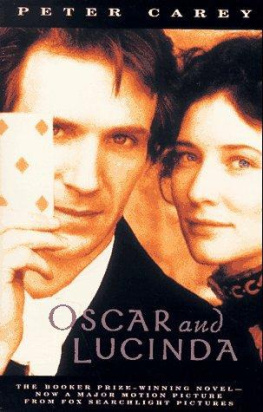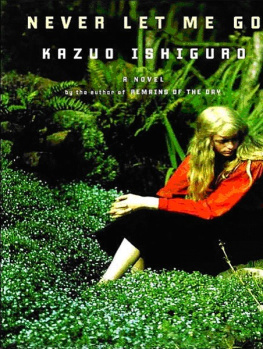
NEVER LET ME GO
Alex Garlandbased on the novel by KAZUO ISHIGURO

CONTENTS
by Kazuo IshiguroKazuo Ishiguro Perhaps youve heard that the cafs of North-West London, especially in its leafier districts, are filled with writers in earnest discussion about their work. This of course is largely myth. As any local will testify, it is babies, not writers, who are to be found dominating any place that will serve a cappuccino, passionately exchanging views on their handlers, food, the latest milestone passed. Though fully aware of this, Alex Garland and I, often together with novelist William Sutcliffe, have been trying for many years now to live the myth of those writers gatherings, battling valiantly against the superior vocal powers of our rival faction. One reward for our efforts, you could say, is the book you are now holding: the film adaptation of
Never Let Me Go was yet another infant that passed through its early developmental stages in those cafs. I first met Alex in the spring of 1998 in a tiny caf in Englands Lane shortly after the publication of his backpacking classic,
The Beach a novel I had mightily enjoyed.
He was in his twenties then, with traces of an adolescent awkwardness still in his posture, but also the assurance peculiar to the unusually talented. He looked like he hadnt slept for days, and ordered Diet Cokes at such a rate the waiter suspected a prank. His imagination seemed to be on fire with ideas and projects, but when he talked, his delivery was controlled, almost halting. I noticed how carefully he watched and listened; how he would weigh up each thing I said, before coming back with a considered, sometimes mildly confrontational response. He was terrific company. We got into the habit of meeting for lunch every two or three months.
The babies sometimes forced us to retreat to the periphery, into eerie restaurants on the brink of bankruptcy. But we went on swapping views on anything and everything, and I can see now this was where the first part of our collaboration on Never Let Me Go really began. I had started to write the novel in early 2001, and would often run ideas past him, without explaining their context or even that they related to my work. Alexs responses were always thought-provoking, sometimes inspiring. And then there was the science-fiction. G. G.
Ballard, Alan Moore; the films of Ridley Scott, Cronenberg, Kubrick. He made me a list of the essential graphic novels I had to read and explained the strengths and weaknesses of that form. Most memorably, he brought to my house one afternoon a first draft of a sci-fi horror screenplay hed just finished, one that would become 28 Days Later, a film that would top the US box office and make him one of the most sought-after writers in the movie industry. It struck me that while my own generation of so-called literary novelists (I am fifteen years older than Alex) regarded science-fiction with instinctive suspicion, many of Alexs looked to it with excitement, as a rich source of enticing conceits and new ways to pose big old questions such as What does it mean to be human? or What does it mean to have a soul? The sci-fi-derived dystopian setting of Never Let Me Go owes an awful lot to those rambling lunches. When, sometime in 2004, Alex read an uncorrected proof of Never Let Me Go and said hed like to turn it into a screenplay, what I felt more than anything was relief. This was partly because, after all our conversations during the writing of the novel, hed become in my mind the natural choice for screenwriter.
But there was another reason why I was convinced Alex would be the perfect adaptor for the screen. At a dinner some months earlier, Id been talking to Alexs publishing editor, Walter Donohue, whod made the point that Alexs work focused obsessively on characters who had been, in some sense, orphaned: who faced the challenge of working out a new societal or familial system in a threateningly altered, near-Hobbesian world. The teenage backpackers of The Beach; the survivors in the post-plague Britain of 28 Days Later; the astronauts of Sunshine, cooped up for years in a spaceship cut off from an earth itself in fear of being orphaned by a fading sun. The parentless world of cloned children trying to make sense of their destiny in Never Let Me Go was absolutely Alex Garland territory. For a time the project remained between the two of us on a handshake basis while Alex concentrated on Sunshine, his original screenplay for which an elaborate set was being constructed in East London. Before long, though, he talked to Andrew MacDonald and Allon Reich at DNA Productions, and contracts were drawn up.
Meanwhile the novel was published, and a small, wonderful Chinese restaurant opened adjoining Hampstead Post Office. This now became our regular meeting place and our discussions about NLMG continued. At one stage Alex mooted the idea of creating the alternative England we needed by shooting somewhere abroad, where the light would be distinctly un-English. (This idea was ditched as impractical, and in any case, proved unnecessary when Mark Romaneks brilliantly personal eye achieved exactly the desired effect with genuine English locations.) Something else we discussed (if youre unfamiliar with the story, here comes a mild spoiler) concerned the question: why dont the protagonists ever try to run away? The novel had left this question provocatively for some readers, annoyingly unaddressed. Should the film version try to supply some answers? Should we have our characters contemplate even attempt escape? Should the film create an infrastructure of physical control absent in the novel? Whenever we returned to this topic, I could sense neither of us had any enthusiasm for it. Alex was no more interested than I had been to tell yet another story of slaves and brave rebellions.
What fascinated us both was the astonishing extent to which people, throughout history, have not tried to run away; the degree to which they have accepted, sometimes with sad dignity and courage, horrible marriages, demeaning and dangerous jobs, dictatorships, orders to charge towards enemy guns. Most crucially, we agreed the film had to resonate as a metaphor for the basic human condition the fact that none of us, ultimately, can run away from death, and have only a poignantly short time to grapple with such things as love, friendship and forgiveness. A question that preoccupied Alex much more was: how do we make it moving? I told him this was now his problem, not mine. But we did discuss a lot what sort of moving. Once, on one of my less inspired days, I suggested the sadness conveyed at the close of the film shouldnt be one of intense anguish, but rather a qualified, resigned, almost satisfied sadness such as yes, I said this when someone dear to you dies at a grand old age, having lived a full and fulfilled life. Perhaps out of politeness, Alex concurred with this notion for a few weeks.
Then one day over lunch he told me it was bollocks. In fact what he said was: Look. The day my dad dies, however long he lives, even if hes really, really old, its going to be a disaster. A complete, fucking disaster. He was, of course, absolutely right. When Alex did sit down to his first draft, he completed it with alarming speed I seem to remember he took less than a week.
It was to go through many revisions, but that first draft was, in essence, very close to the script that follows. Give or take certain details, he had nailed it in one. This screenplay, you will observe, uses perhaps one-sixth of the number of words the novel does possibly even fewer. This reflects one fundamental of adapting from novel to screen: huge hunks must be omitted. The screenwriter must decide not only what is inessential to the new trajectory required by the film, but have the vision to see where large paragraphs of prose can be turned into the often more economical language of cinema: the looks on actors faces, gestures, potent juxtapositions of image and music. No surprise, then, that many things in the novel will not be found here.
Next page
